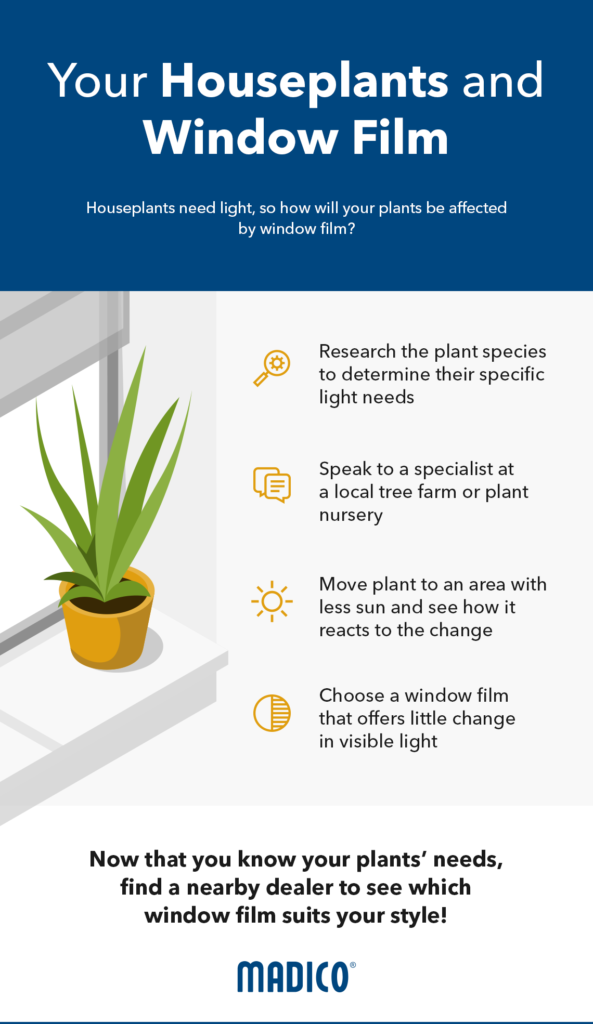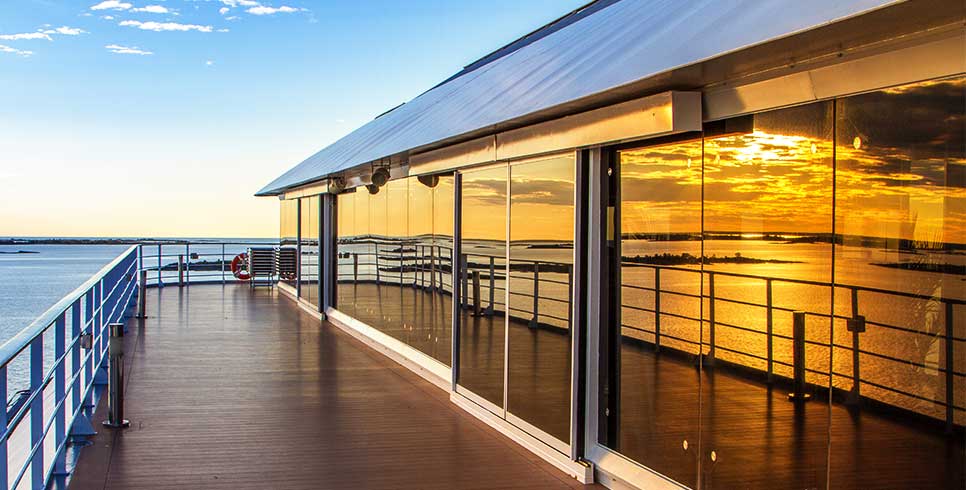Like other common misconceptions about window film, many people think it’s harmful to house plants. Luckily, that’s not the case. Just as home window film can help conserve energy, it can also help your house plants.
A Green Thumbs Up: How Window Film Helps House Plants Flourish

Solar control window film only blocks UV rays – not the red and blue rays that your plants need to grow and flower. And some plants will actually do better with window tints and films, such as those that require less light — which typically have dark green leaves. Delicate plants will also do better with window film because it provides a more stable temperature.
So, for example, if you live in a hot climate during the summer, areas near sunny windows can get very hot and be harmful to delicate plants. Or even in normal circumstances, you may have certain plants that always seem to dry out or wilt on sunny days. Window film will help your greenery retain moisture better. Just remember that all plants – especially fussy ones – need time to adjust to a new environment, so if you see wilting or color loss after installing window film, you can relax. These issues should disappear after a few days.
Frequently Asked Questions About Solar Control Window Film and House Plants
Wondering how window film may affect your plants? While most plants do just fine with tinted window films, you may want a few more answers before you make any decisions.
Will Window Film Kill My House Plants?
In many cases where house plants are already receiving adequate light, adding window film to your home should not harm them. It may take the greenery a few days to adjust to the new lighting conditions, which may impact new plant growth and flowering at first.If you install an optically clear window film, such as UV Gard by Madico®, Inc., your plants should notice little difference. While a transparent window film filters out 99% of UV light, it still transmits 80% of visible light — plenty for your house plants.
For plants that typically wilt before the end of a sunny day, you may notice that they actually thrive even better once the window film is installed. By rejecting some of the bright light and heat that can cause delicate flowers and leaves to burn or lose moisture, window films create a more balanced environment for these types of plants.
If you’re concerned that adding window film to your home will damage your indoor plants, consider moving the plant to an area of your home with less sunlight for a few days to see how it responds. Remember that most plants are sensitive to changes in their environment, so make sure you leave the pot in the new spot long enough to see whether it bounces back. Additionally, most nurseries or local agricultural agencies can advise on the amount of light a particular plant should receive.
Will Frosted Window Film Affect My Plants?
Decorative frosted window film is an excellent option for homeowners who want a little more privacy or a more uniform appearance in a room. Since these films obscure views, many wonder if they also block too much light for their house plants. Frosted windows change the lighting conditions in the room because they diffuse and soften the sunlight that passes through them.
A popular frosted window film, Frost Matte by Madico, offers 67% visible light transmittance, providing adequate light for most indoor greenery. Expect your plants to take some time to adjust since the diffused light is a new, unfamiliar condition for them.
What Types of Plants Need More Light Than Others?
Typically, lighter leaves, or variegated plants, need more light than darker green plants. Darker leaves have higher chlorophyll concentrations, which makes them better able to use the available light for photosynthesis.
What Kind of Light Do Plants Need to Grow?
Contrary to popular belief, plants do not need ultraviolet (UV) light to grow. Plants require blue and red light, which are not a part of the UV color spectrum. Blue light encourages chlorophyll production, which helps the plants create strong and healthy stems and leaves. Red light helps during the early stages of a plant’s life, assisting with seed germination, bulb development and root growth. It also allows a plant to flower and produce fruit.
Plants also need some infrared (IR) light, on the opposite side of the spectrum from UV light. Exposure to adequate levels of far-red wavelengths can encourage blooming and healthy stem growth. However, too much infrared light can damage leaves, stems and flowers. Most window films filter out some infrared light, which we experience as heat. This feature gives homeowners tremendous energy savings. Plants susceptible to damage from hot climates and excessive infrared light will also appreciate it.
Glazes that block a low or moderate amount of IR energy should not deprive your plants of the far-red light they need. You can safely choose a window film that blocks up to 70% of heat energy.
Does Solar Control Window Film Block Natural Light?
Transparent solar window film specifically blocks harmful UV rays while still allowing natural light into your home. There are many styles and colors to choose from to achieve the perfect balance between natural light and UV protection in your home.
Tinted window films darken your windows to filter out more visible sunlight, which does block some red and blue light. The amount of visible light a film lets in depends on its visible light transmittance. A higher percentage means it allows more natural light to pass through, while a lower percentage blocks more sunlight.
In general, the best window film for plants offers 25% light transmittance or higher. Highly reflective or high opacity films may block more than that and should not be used for windows you plan on keeping potted plants near. However, most window films fall above 25% transmittance and let in plenty of natural sunlight. If your plants need lots of sun, consider a film that offers 50% or more light transmittance.
To find the perfect window film for your home, check out our Residential Window Film Selector tool and choose the qualities that are most important to you.

Other Benefits of Window Film for Your Home

By rejecting the sun’s solar energy, window film offers the following benefits for your home:
- Improved home comfort and heat control: Installing window film on your home can help create a more comfortable environment by reducing the temperature in your home.
- Reduced energy costs: By reducing the heat in the summer and reflecting light to keep your home warmer in the winter, you can conserve energy and reduce your air conditioning and heating bills throughout the year.
- Furniture and furnishing fade protection: Reduced exposure to the sun can improve the longevity of your furniture, carpets, woodwork and other interior furnishings by offering significant fade protection.
- Enhanced skin protection: By blocking up to 99% of harmful UV rays that lead to premature skin aging and skin cancer, solar control window film helps protect your skin.
- Increased visibility: Window film also helps reduce glare to improve the visibility of your devices such as computers and TV screens.
As you can see, window film offers many benefits that make your home more comfortable and inviting, allowing you to enjoy the outdoor views without the negative consequences.
Find a Professional Window Film Installer Near You
Madico offers premium window films for homes and businesses made from high-quality adhesives and laminates. And our installers are highly trained to ensure a smooth installation that won’t bubble, peel or crack. We offer a manufacturer’s warranty on all products installed in North America.
Our products offer many advantages, from protecting your plants and building occupants to lowering your energy bills. If you’re interested in enjoying the many benefits of window film, we invite you to find a nearby dealer and check out Madico’s premium line of architectural window film, Sunscape. Your local Madico dealer can recommend home window film products that will meet the lighting requirements of your prized house plants, whether they love direct sunlight or shade.

Updated: 22/06/2021




